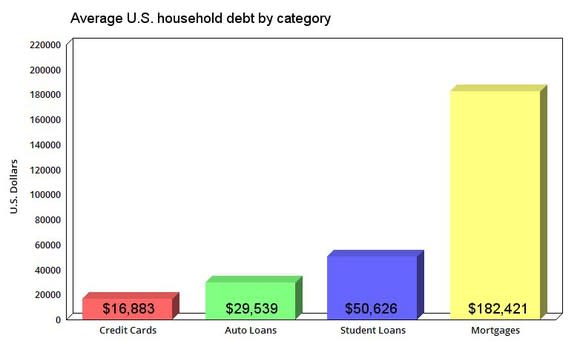A Foolish Take: Here's How Much Debt the Average U.S. Household Owes
The average American household carries $137,063 in debt, according to the Federal Reserve's latest numbers. Yet the U.S. Census Bureau reports that the median household income was just $59,039 last year, suggesting that many Americans are living beyond their means.
Here's how much debt the average U.S. household owes in credit cards, auto loans, student loans, and mortgages.

Data sources: NerdWallet and Federal Reserve. Chart by author.
Those numbers are unlikely to shrink anytime soon, according to NerdWallet. That's because the cost of living in the U.S. rose 30% over the past 13 years, yet household incomes only grew 28%. As a result, more Americans are using credit cards to cover basic needs like food and clothing.
Medical expenses have grown 57% since 2003, while food and housing costs climbed 36% and 32%, respectively. Those surging basic expenses could widen the inequality gap in America, as a quarter of Americans make less than $10 per hour.
On the bright side, education costs rose 26% during that period, and growth in student loan balances has slowed, so the picture could be improving for financially disciplined millennials.
More From The Motley Fool
6 Years Later, 6 Charts That Show How Far Apple, Inc. Has Come Since Steve Jobs' Passing
Why You're Smart to Buy Shopify Inc. (US) -- Despite Citron's Report
The Motley Fool has a disclosure policy.

 Yahoo Finance
Yahoo Finance 